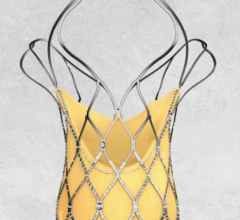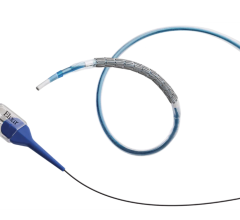September 22, 2009 – Cordis Corp. has received approval from the U.S. Food and Drug Administration (FDA) for a new, smaller version of the CYPHER Sirolimus-Eluting Coronary Stent – the 2.25 mm CYPHER – which is indicated for treatment of coronary blockages in small vessels.
“Small vessels can mean big challenges, and it will be very beneficial for interventionalists and their patients to now have access to a CYPHER® Stent specifically designed for these complex cases,” said John Lasala, M.D., Ph.D., professor of medicine; director, interventional cardiology and medical director, cardiac catheterization, Washington University School of Medicine in St. Louis. Dr. Lasala is affiliated with Barnes-Jewish Hospital in St. Louis. “The long-term clinical benefits of the CYPHER Stent are well documented in a broad range of patient and lesion types and this approval now allows this benefit to be applied to the treatment of small vessels.”
Many types of patients have small vessel disease, including women and those with certain other medical conditions. Small coronary vessels have been associated with an increased risk of re-blockage (restenosis) after stent implantation, which requires another procedure to reopen the vessel. The smaller the artery, the more the regrowth of cells within a stent, and stent recoil narrow the lumen. This accentuates the clinical benefits of the CYPHER Stent, which is unsurpassed in limiting this process.
Today’s approval is based on the results of four studies including, in part, the clinical results of the SES-SMART trial. This trial was a randomized comparison of the 2.25 mm CYPHER Stent to bare metal stents in the reduction of restenosis in small coronary arteries. At two years of follow up, patients receiving the CYPHER Stent had significantly better clinical outcomes than those patients receiving a bare metal stent. In fact, use of the CYPHER Stent led to an 82 percent reduction in restenosis compared to a bare metal stent at six months.
In recent months, the FDA has approved two other drug-eluting stents for the treatment of small vessel disease, the TAXUS Liberte Atom Stent and the TAXUS Express Atom Stent, both of which elute paclitaxel. The CYPHER Stent, which elutes sirolimus, has outperformed the TAXUS stent in numerous clinical trials, Cordis said. In the ISAR-SMART 3 trial, for example, patients treated with the CYPHER Stent had 55 percent less late loss after eight months than patients receiving a TAXUS. Data from the RESEARCH and T-SEARCH registries showed that patients treated with the 2.25 mm CYPHER had a 65 percent lower incidence of death or myocardial infarction (MI) than patients treated with a 2.25 mm TAXUS.
Dr. Lasala is compensated for his time as a consultant to the company and a member of the company’s scientific advisory board.
For more information: www.cypherstent.com, www.cordis.com


 July 02, 2024
July 02, 2024 









